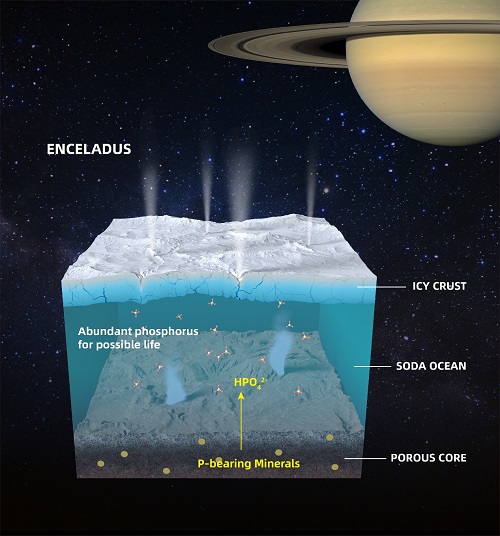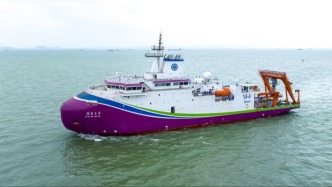Since ancient times, people have looked up at the stars and wondered if there is other life beyond the earth? This is also the goal that researchers are tirelessly pursuing.
Recently, Hao Jihua, a researcher at the School of Earth and Space Sciences, University of Science and Technology of China, and Christopher Glein, a researcher at the Southwest Research Institute in the United States, cooperated with scholars such as Christopher Glein, a researcher at the Southwest Research Institute, to build a theoretical model to simulate the chemistry of Enceladus seawater, revealing for the first time that Enceladus seawater may be rich in phosphorus elements. , supplying possible extraterrestrial life. Related research results were published in the US "Proceedings of the National Academy of Sciences".

Schematic illustration of the large amount of phosphorus released from the metasomatic core rocks of Enceladus. Image source: University of Science and Technology of China
"We can say with confidence that Enceladus has become the only extraterrestrial oceanic star besides Earth that contains the six basic elements of life. And the phosphorus content in its seawater is equivalent to 10,000 times that of the Earth's seawater. It is more suitable for the survival of microorganisms." Hao Jihua introduced to the "Science China Journal".
Enceladus, Saturn's sixth largest moon, is smaller and has a thick layer of ice on its surface. In previous studies, scientists have found abundant carbon, hydrogen, oxygen, nitrogen and a small amount of sulfur in the seawater of Enceladus, as well as a variety of organic substances, but for phosphorus, one of the six basic elements of life Still no relevant reports.
Hao Jihua said, "Phosphorus constitutes the 'energy currency' of all life, and is also an essential material for the creation of DNA and RNA, biofilms, human and animal bones and teeth. However, its content in the earth's water bodies is very low." Therefore, phosphorus scarcity is generally considered to be the key to limiting the origin of life and the scale of modern organisms.
So, is there phosphorus in the seawater of Enceladus? Could the content of phosphorus be the key to limiting the habitability of its life?
In response to these important scientific issues, Hao Jihua and his collaborators collected the data published by NASA's Cassini probe, set the boundary conditions of the ocean chemical environment under the ice of Enceladus, constructed a chemical reaction model of water and rock, and theoretically simulated Enceladus Seawater Chemistry.
"After our study was published, the leader of the imaging team of NASA's Cassini-Huygens probe reprinted it on Twitter for the first time, and emphasized the importance of studying the habitability of Enceladus." Hao Jihua The theoretical predictions were also quickly confirmed by Cassini probe data, he said.
In general, the results of this study fill the gap in the study of the habitability of Enceladus seawater, and provide a scientific reference for the future launch of ice satellite payloads to detect possible life signals in the ocean of Enceladus. In addition, the constructed water-rock chemical reaction model of Enceladus can also be applied to study other nutrient elements and other ice satellite oceans in the future.
Related paper information: https://doi.org/10.1073/pnas.2201388119




Comments